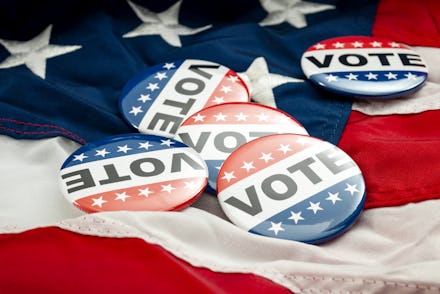New York scraps its presidential primary after state official says voting was essentially "moot"

With the ongoing pandemic, states must reconsider where and how primaries are held. This week, New York cancelled its June presidential primary. Although the committee cited coronavirus as a concern, its overall logic has prompted questions and pushback from numerous politicians.
New York's primary was scheduled for June 23, after being delayed from April 28 due to coronavirus. The decision to cancel the primary came after Democratic commissioners on the New York State Board of Elections voted to remove candidates who had ended their campaigns from the ballot, including Sen. Bernie Sanders (I-Vt.).
Sanders suspended his campaign earlier this month, making former Vice President Joe Biden the presumptive nominee. However, the commissioners received heavy criticism for attempting to remove Sanders's name because his campaign never requested that his name be taken off the ballot. Douglas Kellner, the co-chair of the New York State Board of Elections, maintains the primary was "basically rendered ... moot" after the campaign suspension.
"At a time when the goal is to avoid unnecessary social contact, our conclusion was that there was no purpose in holding a beauty contest primary that would marginally increase the risk to both voters and poll workers," Kellner added.
The decision to cancel the primary outright was labeled "a blow to American democracy" by Sanders campaign adviser Jeff Weaver. In a statement, Weaver called on the Democratic National Committee to overturn the decision.
"While we understood that we did not have the votes to win the Democratic nomination, our campaign was suspended, not ended, because people in every state should have the right to express their preference," Weaver said. The Sanders campaign had previously expressed to supporters that they could continue to vote for the senator because the more delegates he amasses, the more sway he'll have to shape the Democratic Party platform at the summer convention.
New York's changes have not been approved by the DNC. Spokesman David Bergstein told CNN that any substantive changes, such as cancelling the presidential primary, must be received by the DNC's Rules and Bylaws Committee.
"Once the state party submits an updated delegate selection plan, the committee will review that plan and make a determination," Bergstein added.
So far, 16 states have postponed primaries because of coronavirus. In Wisconsin, the Republican Party was widely criticized for its decision to move ahead with in-person voting. Molly McGrath, a voting rights campaign strategist with the American Civil Liberties Union, told Business Insider that the Wisconsin election was "voter suppression on steroids," as people were forced to choose between protecting their health and casting their ballot.
According to The Hill, at least 40 people who voted in person or worked at polls in Wisconsin's elections have tested positive for coronavirus. This means New York certainly has valid concerns with regards to the illness; The New York Times reported that voters in about 20 counties will not need to go to the polls with the presidential primary cancelled.
However, New York will hold its other primary races, which means people still have to go to the polls if they want their voice heard. On Twitter, New York Rep. Alexandria Ocasio-Cortez (D) wrote, "This decision is not informed by public health: The state is still holding elections for every other seat that day [and] so far the only way your ballot will be 100% counted in NY is to vote in person!"
There have been a number of concerns with the coronavirus pandemic happening in an election year. Cancelling one portion of a primary is not really enough to respond to those; if people must go to the polls to vote in other races, then the potential for new cases arising because of voting still remains.
The key issue seems to be that states are not able to effectively utilize options outside of in-person voting, even during a pandemic. This was seen in Wisconsin when the governor's suggestion of having every voter mail in a ballot was called a "fantasy" and "completely disingenuous" by Scott Fitzgerald, the Republican leader of the Wisconsin Senate.
"Just last week Vice President Biden warned the American people that President Trump could use the current crisis as an excuse to postpone the November election," Weaver said. "Well, he now has a precedent thanks to New York state."